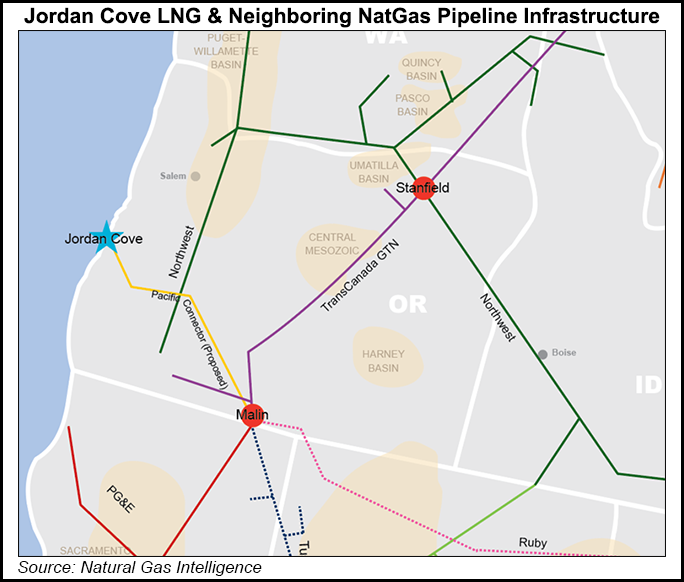Regulatory | LNG | LNG Insight | NGI All News Access | NGI The Weekly Gas Market Report
Jordan Cove LNG Project Wants FERC to Waive Oregon’s Regulatory Authority
Affiliates of Pembina Pipeline Corp. have turned to FERC to jump-start the beleaguered Jordan Cove liquefied natural gas (LNG) export project, arguing that Oregon took too long to issue a key approval that the proposed terminal needs to move ahead with development.

Jordan Cove Energy Project LP and Pacific Connector Gas Pipeline LP have filed a petition for declaratory order asking the Federal Energy Regulatory Commission to waive the Oregon Department of Environmental Quality’s (ODEQ) regulatory authority. The companies argued that the agency far exceeded the one-year statutory timeframe required to issue a water quality certification (WQC) under the Clean Water Act (CWA).
Under section 401 of the CWA, an applicant for a federal permit must provide the federal agency with certification from the state that any discharges from the project comply with water quality standards. If FERC were to waive Oregon’s authority on the matter, that condition would be met.
Jordan Cove submitted a WQC application on October 23, 2017, but ODEQ denied it for failing to meet state standards on May 6, 2019, “more than six months beyond the statutory deadline,” the companies said in their petition.
While ODEQ also made several attempts to extend the review period beyond one year, the companies allege that none of those attempts had merit under the law.
The situation mirrors others across the country, particularly in New York, where state regulators have repeatedly prolonged CWA reviews before denying WQC applications and stymying natural gas pipeline projects. In those cases, FERC waived the state’s regulatory order, finding in each instance that regulators took too long to make a decision.
“Because the statute and FERC precedent require the state to grant or deny the request no later than one year from receipt, ODEQ’s review period expired on October 23, 2018,” the companies said.
The Commission has made case-by-case decisions. It even reversed an order not to waive New York’s authority after a key federal court decision found that states can’t direct project sponsors to withdraw and resubmit WQC applications to reset the statutory clock and prolong regulatory reviews.
Jordan Cove would be the first natural gas export facility sited on the U.S. West Coast, where fossil fuel projects have faced staunch opposition. The state also has denied other authorizations for the project, including a dredging permit and a finding that the terminal is not consistent with the Oregon Coastal Management Program.
FERC authorized the project in March on a split vote. But it’s also faced fierce opposition from environmental groups since it was first proposed by Veresen Inc., which is now part of Pembina.
FERC rejected an application for the project in March 2016, citing problems with its Pacific Connector pipeline link to tap Western Canada and U.S. Rockies natural gas supplies, along with a lack of contracts from buyers. The application was refiled in September 2017. FERC staff issued a final environmental impact statement for Jordan Cove and the Pacific Connector pipeline in November.
The terminal would be capable of liquefying up to 1.04 Bcf/d for export. It would include a pipeline gas conditioning facility, five liquefaction trains, two LNG storage tanks, an LNG loading platform and transfer line, marine facilities and associated facilities.
© 2024 Natural Gas Intelligence. All rights reserved.
ISSN © 1532-1231 | ISSN © 2577-9877 | ISSN © 1532-1266 |
